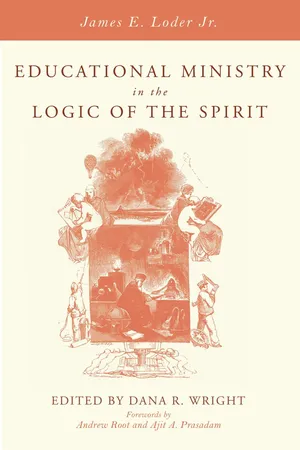
- 416 pages
- English
- ePUB (mobile friendly)
- Available on iOS & Android
About this book
In November 2001, James E. Loder Jr., Professor of the Philosophy of Christian Education for forty years at Princeton Theological Seminary, suddenly died. He was a creative and profound thinker who had just completed a promising book. In it he developed a compelling interdisciplinary model to disclose how the divine Spirit affirms, reconstitutes, and transforms the human spirit to bring new energy and creativity into human experience. He called it redemptive transformation. You now hold that book in your hands. Those who know Loder's work are confident that Educational Ministry in the Logic of the Spirit, though delayed for over fifteen years, will still become the best introduction to his complex thought. More important, it offers the imaginative means by which we may learn to attune ourselves and our faith communities to what God is doing in our fractured, distracted, and self-destructive world to bring about a revolution of love--the fruit of Christ's Spirit and the center of our human vocation.
Frequently asked questions
- Essential is ideal for learners and professionals who enjoy exploring a wide range of subjects. Access the Essential Library with 800,000+ trusted titles and best-sellers across business, personal growth, and the humanities. Includes unlimited reading time and Standard Read Aloud voice.
- Complete: Perfect for advanced learners and researchers needing full, unrestricted access. Unlock 1.4M+ books across hundreds of subjects, including academic and specialized titles. The Complete Plan also includes advanced features like Premium Read Aloud and Research Assistant.
Please note we cannot support devices running on iOS 13 and Android 7 or earlier. Learn more about using the app.
Information
Table of contents
- Title Page
- Permissions
- Foreword (United States)
- Foreword (India)
- Preface
- Editor’s Preface
- Acknowledgments
- Abbreviations
- Section I: Introductory Dilemmas and a Critical Perspective
- Section II: Socialization Dominance
- Section III: Theological Considerations
- Section IV: Human Participation in Divine Action
- Bibliography